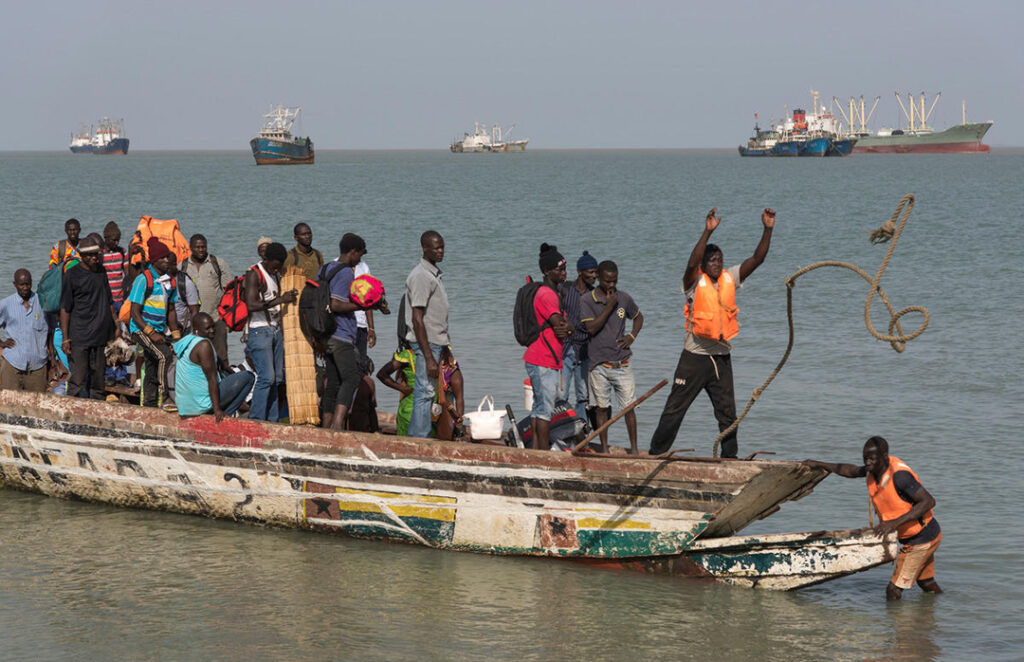ADF STAFF
Mario Boris Fernandez pulled his artisanal fishing canoe ashore at Porto de Bandim in Guinea-Bissau. A longtime fisherman in Bissau, the national capital, he did not struggle with the weight of a large haul.
That’s the upside of fishing all night and returning with little catch.
“Two decades ago, when I started fishing here, our catches were so plentiful that I could take care of feeding, clothing and other social issues of my family, without any difficulty,” Fernandez told China Dialogue Ocean. “It’s now proving difficult to get the quantity and quality of fish we used to have.”
At a nearby fish market, customers complained of steadily rising prices.
“This is all that I do to support my husband in taking care of the family,” said Fatou Sanneh, a fish seller. “I have been selling fish in this market for close to 15 years. I can recall the time when we would pick which type of fish to buy from the fishermen because the supply was enough. The fish business was profitable.”
Due to decades of overfishing and illegal fishing by foreign industrial fishing fleets, especially from China, those days are over. Declining fish stocks are a serious problem for a country where 25% of the population of 1.8 million suffers from chronic malnutrition.
The fisheries sector employs more than 225,000 people and provides 35% of the nation’s animal protein intake.
According to Kebba Badji, another artisanal fisherman at Porto de Bandim, foreign industrial trawlers commonly fish in areas reserved for small-scale operations.
The trawlers are known for bottom trawling, which indiscriminately catches all manner of marine life and destroys ecosystems critical to the survival of fish. They also discard unwanted fish back into the sea, which is illegal.
“They will catch all types of fish and then collect what they want and throw the rest of the dead fish into the sea,” Badji told China Dialogue Ocean. “That is destroying the ocean.”
Badji argued that the industrial trawlers should have a limit to how much they can catch.
“This is unsustainable,” he said.
It’s a scourge that affects the entire region. About 20% of illegally caught fish worldwide comes from waters near The Gambia, Guinea, Guinea-Bissau, Mauritania, Senegal and Sierra Leone, according to a report by news organization Investigative Journalism Reportika.
Most of the fish are caught by vessels from China, which commands the world’s largest distant-water fishing fleet and holds the world’s worst illegal, unreported and unregulated (IUU) fishing record, according to the IUU Fishing Index.
Chinese bottom trawlers catch an estimated 2.35 million tons of fish a year in the region, accounting for 50% of China’s total distant water catch and worth about $5 billion, according to the Environmental Justice Foundation.
Nearly half of the world’s industrial and semi-industrial trawlers involved in illegal fishing operate in Africa. West Africa, the world’s epicenter for IUU fishing, attracts 40% of the world’s illegal trawlers, the Financial Transparency Coalition reported.
Illegal fishing costs the continent up to $11.49 billion annually.
Combatting IUU fishing is particularly difficult in Guinea-Bissau due to a lack of law enforcement patrol capacity and shortcomings in the justice system.
Domingos Quade, a lawyer and politician from Guinea-Bissau, argued that fines of up to $420,000 for serious offenses such as fishing in prohibited zones should be much higher.
“For example, the law should be clear in defining limitations for the fishing boats, the type of nets to be used, how to use them — and laws should be enforced,” Quade told China Dialogue Ocean.

